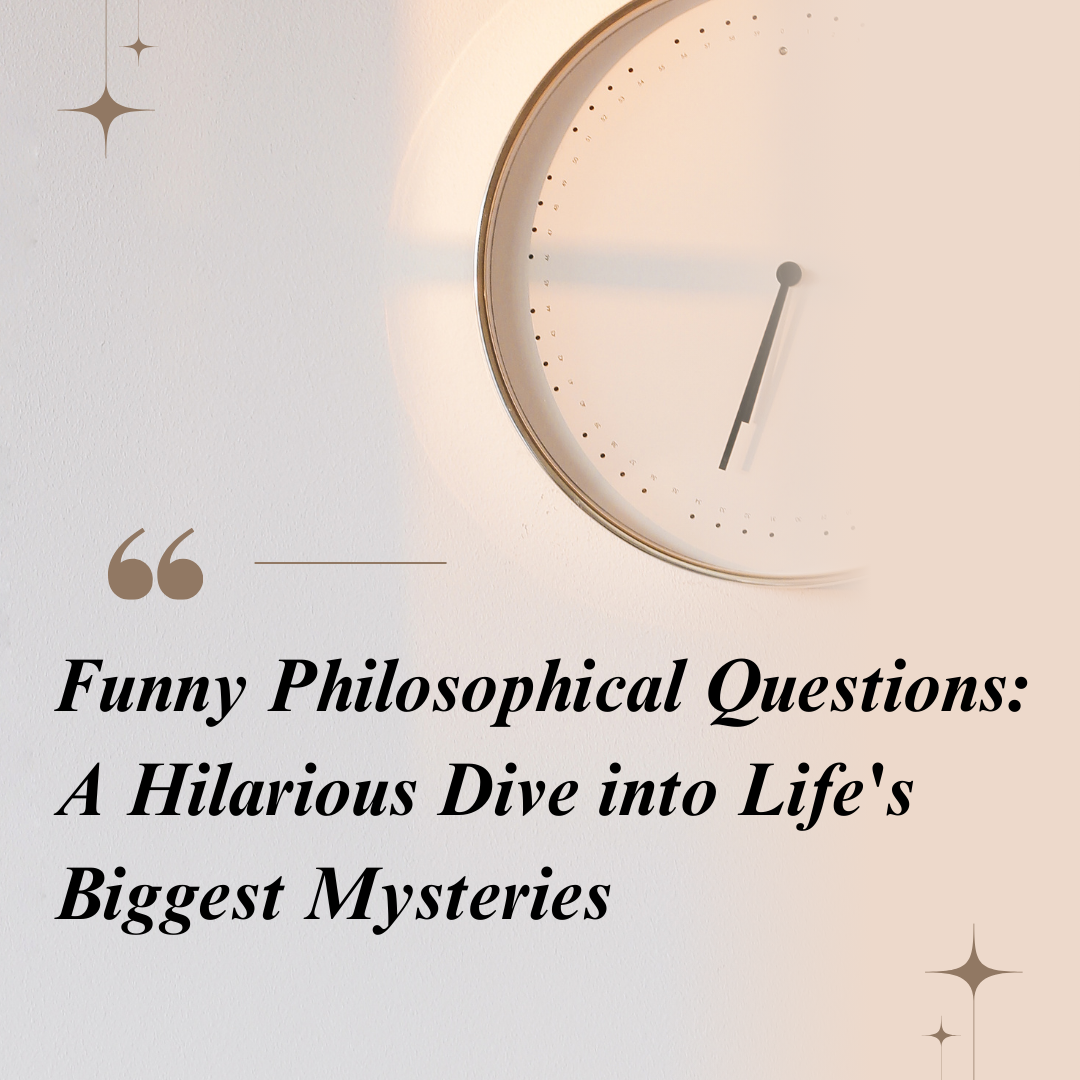
Introduction
Funny philosophical questions are a delightful mix of wit and wonder that challenge us to think about life’s biggest mysteries while keeping the mood light and playful. Imagine sitting with friends or family and debating whether a hotdog is a sandwich or pondering why we never see baby pigeons. These quirky musings may sound silly, but they spark genuine curiosity, encouraging us to explore deeper ideas about existence, reality, and everything in between.
Philosophy often feels like a daunting subject, associated with thick textbooks and abstract theories. But funny philosophical questions bring a refreshing twist. They combine humor with intellect, creating conversations that are both thought-provoking and entertaining. Whether you’re debating what color a mirror truly is or why your left shoe always goes missing first, these questions remind us that life doesn’t always need serious answers. Sometimes, the joy lies in simply asking and laughing.
In this blog, we’ll dive into a collection of funny philosophical questions that not only tickle your brain but also make you chuckle. Perfect for parties, casual chats, or even personal reflection, these questions prove that philosophy isn’t just about solving life’s mysteries—it’s about enjoying them too. Get ready to laugh, think, and maybe even rethink the way you see the world!
Funny Philosophical Questions That Will Leave You Scratching
Your Head Funny philosophical questions have a magical way of blending humor and intellectual curiosity. They take everyday scenarios and flip them upside down, forcing us to think deeply about the most trivial things. For instance, why do we park in a driveway and drive on a parkway? These seemingly nonsensical queries challenge our assumptions and offer a fresh perspective on the world around us. They leave us scratching our heads, not because we feel confused, but because we realize how much we take for granted. The joy lies in unraveling these quirky mysteries, even if the answers don’t really exist.
Exploring Life’s Big Mysteries Through Funny Philosophical Questions

Life’s big mysteries don’t always need to be tackled with a serious face. Sometimes, funny philosophical questions allow us to approach profound topics in a lighter, more enjoyable way. Imagine pondering whether time really exists or if it’s just something humans invented to keep track of their busy schedules. These questions remind us that life is as much about playfulness as it is about purpose. By exploring the mysteries of existence with humor, we open ourselves to deeper connections and a greater appreciation for the absurdities of life.
Why Funny Philosophical Questions Are Perfect for Deep Thinkers with a Sense of Humor
Deep thinkers often crave intellectual stimulation, but the addition of humor makes the experience all the more rewarding. Funny philosophical questions allow them to explore thought-provoking ideas without getting bogged down in existential dread. Whether it’s asking why we can never tickle ourselves or pondering if fish ever get thirsty, these questions bring a refreshing levity to deep discussions. They balance introspection with laughter, proving that wisdom doesn’t always have to come from serious contemplation.
Can You Answer These Hilarious Yet Thought-Provoking
Philosophical Questions? Funny philosophical questions are notorious for being nearly impossible to answer. Why does your nose run but your feet smell? Or, if Cinderella’s shoe was a perfect fit, why did it fall off? These hilarious yet thought-provoking questions are designed to stump even the sharpest minds. But the real joy isn’t in finding the answer—it’s in exploring the question. These riddles of logic and humor challenge our thinking in unexpected ways, leaving us laughing at their absurd brilliance.
Funny Philosophical Questions to Spark Laughter and Reflection
The beauty of funny philosophical questions lies in their ability to spark both laughter and reflection simultaneously. Take, for example, the classic “If a tree falls in a forest and no one hears it, does it make a sound?” While this question can lead to profound debates about perception and reality, it also carries an air of ridiculousness that keeps the mood light. These questions effortlessly shift between hilarity and depth, making them the perfect conversation starters.
How Funny Philosophical Questions Make Philosophy Fun Again
Philosophy has long been seen as a dry and difficult field, but funny philosophical questions breathe new life into it. They strip away the pretentiousness and make philosophical thinking accessible to everyone. Instead of grappling with dense texts, you might find yourself wondering if clapping is just high-fiving yourself for someone else’s accomplishment. Questions like these prove that philosophy isn’t just for scholars—it’s for anyone who loves to think, laugh, and question the ordinary.
10 Funny Philosophical Questions That Will Challenge Your Logic
Logic often breaks down in the face of funny philosophical questions, making them all the more enjoyable to consider. For instance, why is it called a “building” if it’s already built? Or, if you try to fail and succeed, what have you actually done? These questions twist our understanding of language and logic into knots, leaving us both amused and amazed. They challenge us to rethink the rules we take for granted, one laugh at a time.
Why Are Funny Philosophical Questions So Addictive to Ponder?
Once you dive into the world of funny philosophical questions, it’s hard to stop. They tap into our innate curiosity and love of humor, creating a mental playground where anything is possible. Whether you’re debating if the chicken or the egg came first or wondering why humans have eyebrows, these questions invite endless exploration. Their addictive quality lies in their simplicity—just when you think you’ve answered one, another pops up to keep the fun going.
The Best Funny Philosophical Questions to Ask Your Friends

Funny philosophical questions are the ultimate icebreakers, sparking laughter and deep conversations at the same time. Asking your friends, “If you could teleport but only to public restrooms, would you still use it?” can lead to surprising debates and creative scenarios. These questions let everyone share their unique perspectives, often revealing more about a person’s sense of humor and logic than expected. They’re a great way to bring people closer through shared laughter and thought.
What Do Funny Philosophical Questions Teach Us About Life?
Funny philosophical questions often hold deeper lessons about life. They remind us to not take ourselves—or our problems—too seriously. A question like, “If we’re always told to think outside the box, who built the box in the first place?” encourages us to question the norms and structures that define our thinking. These questions teach us that life’s greatest insights often come from the simplest, funniest observations.
Funny Philosophical Questions That Will Keep You Up at Night Laughing
Some funny philosophical questions are so absurdly clever that they linger in your mind, making you chuckle long after you’ve heard them. For example, if Pinocchio says, “My nose will now grow,” what happens? These questions have a way of sticking with you, sparking debates with yourself in the middle of the night. They’re the perfect blend of humor and curiosity, ensuring that your brain stays entertained even in the quiet hours.
The Hidden Wisdom Behind Funny Philosophical Questions
Beneath their humor, funny philosophical questions often carry nuggets of wisdom. They encourage us to approach life with a mix of curiosity and lightheartedness. Questions like, “If ignorance is bliss, why aren’t more people happy?” force us to confront deeper truths about happiness and human nature. By making us laugh, these questions also help us see the profound in the ridiculous, showing that wisdom can come from even the most unexpected places.
How Funny Philosophical Questions Can Break the Ice in Any Conversation F
unny philosophical questions are the perfect antidote to awkward silences. They have a way of instantly engaging people and creating a relaxed, lighthearted atmosphere. Asking, “If animals could talk, which species would be the rudest?” is bound to spark laughter and lively debate. These questions are great because they’re intriguing yet low-pressure—everyone feels comfortable chiming in, whether they’re offering a serious answer or a ridiculous one. With a single well-timed question, you can transform a dull moment into a memorable one.
Is It Possible to Answer Funny Philosophical Questions Seriously?
The beauty of funny philosophical questions is that they can be as serious or silly as you want them to be. Take, for example, “If we evolved from monkeys, why are there still monkeys?” On the surface, it’s a humorous question, but dive deeper, and it opens a discussion about evolution and natural selection. The versatility of these questions lies in their dual nature—they can challenge your intellect while still making you laugh. Serious or silly, the answers often reveal as much about the responder as they do about the question itself.
Funny Philosophical Questions That Prove Humor and Wisdom Go Hand in Hand
Humor and wisdom may seem like an odd pair, but funny philosophical questions prove they’re inseparable. Questions like, “If you borrow a book from a library and never return it, is it still a library book?” offer more than just a laugh—they challenge our perspectives on ownership and ethics. The humor makes the wisdom accessible, turning abstract ideas into relatable, entertaining concepts. By laughing at life’s contradictions, we often find deeper truths hidden within them.
When Funny Philosophical Questions Reveal Life’s Absurdities
Life is full of absurdities, and funny philosophical questions have a way of shining a spotlight on them. Questions such as, “Why is the word ‘abbreviation’ so long?” or “If tomatoes are fruit, why isn’t ketchup a smoothie?” highlight the quirks and contradictions we usually overlook. These questions remind us to embrace the ridiculous aspects of life, showing that even the strangest inconsistencies have their charm. After all, it’s in these absurdities that we often find the most joy.
How to Turn Any Conversation Deep with Funny Philosophical Questions
Funny philosophical questions have a sneaky way of steering even the most lighthearted chats into meaningful discussions. Ask someone, “If you could erase one memory from your life, would you?” and you’ll likely spark a debate about regret, growth, and the nature of happiness. These questions start off playful but often lead to profound revelations. They’re a reminder that depth doesn’t always come from seriousness—it can begin with a laugh and end with a new perspective.
The Science of Laughing at Funny Philosophical Questions
Laughter, they say, is the best medicine, and funny philosophical questions are the perfect prescription. When we laugh at these questions—like, “If oranges are orange, why aren’t bananas called yellows?”—our brains release endorphins, making us feel happier and more relaxed. But there’s more at play than just humor. These questions also engage critical thinking and creativity, stimulating multiple parts of the brain. The result? A perfect blend of entertainment and intellectual exercise.
Are Funny Philosophical Questions the Secret to Happiness?
Funny philosophical questions may not hold the key to eternal happiness, but they come pretty close. They offer a unique way to step back from life’s stresses and enjoy the simple act of pondering. Questions like, “If money doesn’t grow on trees, why do banks have branches?” remind us not to take everything so seriously. In their humor lies a lesson: life isn’t about finding all the answers—it’s about enjoying the questions along the way.
The Most Mind-Boggling and Funny Philosophical Questions Ever Asked

Some funny philosophical questions have a way of sticking with us long after we hear them. For instance, “If you’re waiting for the waiter, aren’t you technically the waiter?” These mind-boggling queries play with our perceptions of language, logic, and reality, leaving us both entertained and perplexed. They remind us that sometimes the best questions aren’t the ones we can answer—they’re the ones that leave us laughing and thinking in equal measure.
Funny Philosophical Questions You’ve Probably Never Thought About
While we’ve all heard the classics, there’s an endless world of funny philosophical questions waiting to be discovered. Have you ever wondered, “If soap gets dirty, is it still considered clean?” or “Do bald people get dandruff?” These offbeat queries spark laughter precisely because they tackle the most unexpected topics. They encourage us to think outside the box and explore ideas we never even knew existed, proving that there’s always room for more curiosity—and more laughs.
How Funny Philosophical Questions Can Expand Your Mind and Your Humor
Funny philosophical questions have the power to stretch your thinking in ways you never imagined. Pondering, “Why do we call it a ‘pair of pants’ if it’s just one item?” can lead to discussions about language, culture, and history. At the same time, these questions expand your sense of humor, teaching you to see the world in a new, more playful light. They’re a reminder that intellectual growth doesn’t always have to be serious—it can be a lot of fun too.
The Joy of Asking and Answering Funny Philosophical Questions
There’s something uniquely satisfying about diving into funny philosophical questions. Whether you’re the one asking or answering, these questions create a shared experience of curiosity and laughter. Imagine the fun of debating, “If we have free will, why can’t we choose not to need coffee in the morning?” These questions bring people together, sparking joy and connection through their universal appeal.
When Silly Meets Profound: Funny Philosophical Questions Explored
Funny philosophical questions thrive at the intersection of silly and profound. They take the ordinary and transform it into something worth pondering. For instance, “If you pour soup into a bowl of cereal, is it still breakfast?” seems absurd at first but challenges how we define categories and context. In these playful moments, we find profound insights about how we view the world, proving that even the silliest questions have depth.
Funny Philosophical Questions That Turn the Ordinary Into the Extraordinary
What makes funny philosophical questions so special is their ability to elevate the mundane. A simple act like closing a fridge door can lead to the question, “Does the light really turn off when the door closes?” These queries encourage us to see the extraordinary in everyday life. They invite us to pause, reflect, and laugh at the small details we often overlook, reminding us that curiosity is a gift we should never lose.
The Art of Crafting and Answering Funny Philosophical Questions
Coming up with a great funny philosophical question is an art form. It requires a balance of wit, creativity, and just the right amount of absurdity. For example, “If you could swap lives with your pet, would they live yours better than you do?” opens the door to humor and self-reflection. Answering these questions is an equally creative process, challenging us to think critically while keeping the mood light. Together, they create a playful dance between imagination and logic.
Why Funny Philosophical Questions Are Perfect for Group Discussions
In group settings, funny philosophical questions can bring everyone together in a way that few topics can. Questions like, “If you could choose a superpower, but it had to be utterly useless, what would it be?” ensure that everyone feels included and has something to contribute. These questions foster creativity and camaraderie, as people share their ideas and laugh at the inventive or absurd answers. They’re an instant icebreaker and a great way to make meaningful connections through humor.
Can Funny Philosophical Questions Challenge Traditional Thinking?
Funny philosophical questions often pack a surprising punch when it comes to challenging traditional thought. Take, for example, “If time is money, is an ATM a time machine?” This quirky query doesn’t just make us laugh—it pushes us to think differently about familiar concepts. By flipping conventional ideas on their head, these questions encourage us to reexamine what we take for granted, proving that humor is a powerful tool for intellectual growth.
The Role of Humor in Exploring Complex Philosophical Ideas
Humor makes complex ideas more approachable, and funny philosophical questions are the perfect example. Imagine tackling a heavy topic like identity with a question like, “If you change your name, are you still the same person?” The humor softens the intensity of the subject while still allowing for deep exploration. This blend of lightheartedness and intellectual curiosity makes philosophy accessible to everyone, regardless of their background or experience.
Funny Philosophical Questions That Kids Can Relate To
Kids have an incredible ability to see the world in unique and imaginative ways, making them the perfect audience for funny philosophical questions. Ask a child, “If your toys could talk, what would they say about you?” and you’ll likely hear answers that are both hilarious and thought-provoking. These questions tap into their natural curiosity, sparking creativity and teaching them to think critically while having fun.
When Funny Philosophical Questions Take a Turn for the Existential
Even the funniest philosophical questions can have a surprisingly existential undertone. Consider, “If a tree falls in the forest and no one is around to hear it, does it still make a sound?” While it might initially sound amusing, this question delves into deep ideas about perception, reality, and existence. Funny philosophical questions often balance on the edge of humor and profound insight, showing that even laughter can lead to moments of reflection.
The Unexpected Depth of Funny Philosophical Questions
Funny philosophical questions often catch us off guard with their depth. What starts as a joke—like, “If humans are so smart, why do we make round pizzas in square boxes?”—can evolve into a meaningful discussion about efficiency, tradition, and consumer habits. These questions are a reminder that laughter and insight aren’t mutually exclusive; they often coexist in surprising and delightful ways.
How Funny Philosophical Questions Highlight Everyday Ironies
Life is full of ironies, and funny philosophical questions have a way of pointing them out in the most entertaining fashion. Questions like, “Why do we press harder on the remote when we know the batteries are dead?” shine a humorous light on our habits and idiosyncrasies. By laughing at these everyday moments, we not only enjoy the humor but also gain a deeper appreciation for the quirks that make us human.
Funny Philosophical Questions That Challenge the Meaning of Words
Language is full of surprises, and funny philosophical questions often play with this in delightful ways. For instance, “If you clean a vacuum, does that make you a vacuum cleaner?” pokes fun at the double meanings and ambiguities in our everyday speech. These questions remind us that words are flexible, and sometimes their humor lies in their ability to confuse and amuse us at the same time.
Why Funny Philosophical Questions Are the Ultimate Creative Exercise
Answering funny philosophical questions is like giving your brain a workout. Questions such as, “If you could only eat one color of food for the rest of your life, what color would you choose?” demand creative thinking and a touch of humor. These exercises encourage us to think beyond the obvious, expanding our imagination while keeping things light and enjoyable.
The Social Power of Sharing Funny Philosophical Questions
Funny philosophical questions have a unique ability to bring people together. Sharing a question like, “If you could only communicate in song, which genre would you choose?” often leads to laughter, storytelling, and a deeper understanding of one another. These questions act as a social glue, breaking down barriers and sparking conversations that might not happen otherwise.
How Funny Philosophical Questions Redefine Wisdom
Wisdom is often associated with seriousness, but funny philosophical questions challenge that notion. Questions like, “If we learn from our mistakes, why are we so afraid of making them?” combine humor with profound insight. They show that wisdom doesn’t have to be heavy or somber—it can come wrapped in a joke, making it more relatable and accessible to everyone.
Exploring the Boundaries of Reality with Funny Philosophical Questions
Funny philosophical questions often blur the line between reality and imagination. Consider, “If you dream in color, do you pay extra for it?” This question takes something as abstract as dreaming and adds a playful twist, encouraging us to question the nature of our experiences. These moments of levity open doors to deeper conversations about perception and the human mind.
Funny Philosophical Questions as a Gateway to Critical Thinking
Critical thinking doesn’t always have to be a serious endeavor. Funny philosophical questions like, “If Cinderella’s shoe fit perfectly, why did it fall off?” challenge us to analyze stories and assumptions in new ways. By engaging our logical and creative sides, these questions make critical thinking an enjoyable process, blending entertainment with intellectual discovery.
How Funny Philosophical Questions Inspire Perspective Shifts
Sometimes, all it takes to see the world differently is a well-phrased question. Ask someone, “If you had to choose between being invisible or being able to fly, which would you pick and why?” and you’ll uncover insights into their priorities and imagination. These questions inspire us to think beyond our usual frames of reference, offering fresh perspectives and endless opportunities for self-reflection.
Why Funny Philosophical Questions Spark Joy in Everyday Life
Funny philosophical questions remind us not to take life too seriously. A question like, “If animals could talk, which one would be the rudest?” might seem trivial at first glance, but it quickly transforms into a delightful exercise in imagination. These questions bring lightness to our routines, injecting humor and curiosity into even the most mundane moments. They help us find joy in small things, fostering a sense of playfulness in everyday life.
The Unifying Magic of Funny Philosophical Questions Across Cultures
Humor is a universal language, and funny philosophical questions have a way of crossing cultural boundaries. A query such as, “If a mime gets arrested, do they still have the right to remain silent?” doesn’t just elicit laughter—it sparks curiosity about how people in different cultures might perceive the same idea. These questions invite a shared experience of laughter and wonder, bringing diverse perspectives together in a uniquely engaging way.
Funny Philosophical Questions That Make You Rethink Your Priorities
Sometimes, a silly question can reveal profound truths about what truly matters. For instance, “If you could choose to live in a world without chocolate or a world without coffee, which would you pick?” might seem whimsical, but it encourages us to reflect on our everyday indulgences and the little things that bring us joy. These questions challenge our priorities in a lighthearted yet surprisingly meaningful way.
How Funny Philosophical Questions Revive the Inner Child
Children are natural philosophers, and funny philosophical questions often bring out that same sense of wonder in adults. A question like, “If you could live in any cartoon world, which one would it be?” rekindles the joy of imagination and play. These questions take us back to a simpler time, reminding us of the importance of curiosity and the value of looking at the world through a playful lens.
Can Funny Philosophical Questions Improve Decision-Making?
Funny philosophical questions might seem unrelated to serious decision-making, but they can actually enhance our ability to think critically. Questions like, “If you were stranded on a desert island and could only bring one condiment, which would it be?” push us to evaluate our choices in unexpected ways. By engaging our creativity and logic, these humorous dilemmas prepare us to approach real-life decisions with a more open mind.
Funny Philosophical Questions That Blur the Line Between Genius and Absurdity
There’s a fine line between genius and absurdity, and funny philosophical questions love to walk it. Take, for instance, “If we’re always told to think outside the box, why is there even a box in the first place?” This playful question invites us to challenge conventional wisdom and embrace creative thinking. It’s a reminder that humor and innovation often go hand in hand, sparking new ideas through lighthearted exploration.
Why Funny Philosophical Questions Are the Perfect Icebreakers
In any social setting, funny philosophical questions are a surefire way to break the ice. Imagine asking a room full of strangers, “If you could only communicate using emojis, which one would describe your personality best?” The responses are bound to be entertaining and insightful, creating an instant connection. These questions encourage laughter and conversation, making everyone feel more at ease and opening the door to deeper discussions.
Exploring the Paradoxes of Life Through Funny Philosophical Questions
Life is full of paradoxes, and funny philosophical questions help us explore them in a lighthearted way. For example, “If you try to fail and succeed, what did you just do?” blends humor with intellectual intrigue. These questions make us laugh while challenging our understanding of logic and reality, proving that philosophy doesn’t always have to be serious to be meaningful.
How Funny Philosophical Questions Fuel Creativity in Writing and Art
For writers and artists, funny philosophical questions are a goldmine of inspiration. A question like, “If clouds are made of water, why don’t they fall from the sky?” can spark an entire story or painting. These playful prompts encourage us to think differently about the world, providing endless fodder for creative expression and exploration.
Funny Philosophical Questions That Push Boundaries Without Offending
Humor can be tricky, but funny philosophical questions strike a perfect balance. Questions like, “If you could pause time, what would be the first thing you’d do?” are provocative without being polarizing. They invite people to explore boundaries and ideas without fear of judgment, fostering inclusive and engaging conversations.
The Science Behind Why Funny Philosophical Questions Make Us Think
What makes a question like, “If you were a vegetable, what vegetable would you be and why?” so thought-provoking? Neuroscience suggests that humor activates the brain’s reward system, making us more open to creative thinking. Funny philosophical questions tap into this by combining humor with cognitive challenge, creating a uniquely stimulating experience that leaves us both laughing and reflecting.
How Funny Philosophical Questions Enhance Empathy
Funny philosophical questions often reveal surprising insights about the people around us. When someone answers, “If you had to swap lives with a fictional character, who would it be?” they’re sharing their values, dreams, and inspirations. These questions encourage empathy by giving us a glimpse into others’ perspectives in a way that’s both entertaining and deeply human.
The Joy of Spontaneous Conversations Sparked by Funny Philosophical Questions
Some of the best conversations happen spontaneously, and funny philosophical questions are perfect catalysts. A question like, “If you could rename one thing in the world, what would it be?” often leads to laughter, debates, and unexpected tangents. These moments of spontaneous dialogue remind us of the beauty of unscripted connections and the power of a good question to bring people together.
Funny Philosophical Questions That Bridge Generational Gaps
One of the most fascinating aspects of funny philosophical questions is their ability to resonate across age groups. A question like, “If technology keeps advancing, will future grandparents tell stories about their social media posts instead of their childhoods?” can spark conversations between generations. These humorous yet insightful queries help older and younger individuals connect by exploring how perspectives on life, technology, and culture differ—and often overlap—across the years.
The Unexpected Role of Funny Philosophical Questions in Education
In classrooms, funny philosophical questions can be powerful tools for engagement. Imagine asking students, “If two mind-readers are reading each other’s minds, whose thoughts are they really reading?” This type of question stimulates critical thinking while keeping the atmosphere light and enjoyable. Educators can use these questions to teach complex concepts in philosophy, logic, and ethics, proving that learning can be both fun and intellectually stimulating.
Funny Philosophical Questions as a Mirror to Our Quirks
Humans are wonderfully quirky, and funny philosophical questions have a way of showcasing those quirks. For example, “Why do we yell ‘duck’ when we really mean ‘get out of the way’?” highlights the oddities of language and communication. These questions make us laugh at ourselves while offering gentle reminders of the idiosyncrasies that make us unique as individuals and as a species.
How Funny Philosophical Questions Build Resilience
Humor and resilience are closely linked, and funny philosophical questions can help us build both. A question like, “If life gives you lemons but you’re allergic to citrus, what do you do?” might sound silly, but it encourages creative problem-solving and a positive outlook. By finding humor in hypothetical challenges, we learn to approach real-life obstacles with curiosity and a light heart.
Funny Philosophical Questions That Turn Mundane Moments into Magic
Even the most ordinary moments can become extraordinary when viewed through the lens of funny philosophical questions. Consider, “If socks are supposed to be in pairs, why do they keep disappearing in the laundry?” This question transforms a mundane household annoyance into a source of laughter and speculation, reminding us that even everyday life is full of mysteries worth pondering.
The Influence of Funny Philosophical Questions on Pop Culture
Pop culture often borrows from funny philosophical questions to create memorable moments in movies, TV shows, and books. Questions like, “If a superhero loses their powers, are they still a hero?” have fueled countless storylines and debates. These questions resonate with audiences because they mix humor with profound ideas, creating narratives that are both entertaining and thought-provoking.
Why Funny Philosophical Questions Are Perfect for the Digital Age
In a world dominated by memes and quick laughs, funny philosophical questions are tailor-made for the digital age. A question like, “If memes are the language of the internet, who’s the Shakespeare of memes?” is not only humorous but also reflective of our evolving culture. These questions thrive on social media, sparking viral conversations and connecting people across the globe with humor and wit.
The Role of Funny Philosophical Questions in Mindfulness Practices
Funny philosophical questions can bring us into the present moment in an unexpected way. A question like, “If you could pause one moment in your life forever, which would it be and why?” encourages us to reflect on what truly matters. These questions, while lighthearted, can be a form of mindfulness, helping us appreciate life’s fleeting but beautiful moments with laughter and thoughtfulness.
Funny Philosophical Questions That Redefine Reality
Reality often feels fixed, but funny philosophical questions challenge that perception. A query like, “If we all see colors differently, how do we know blue is the same for everyone?” forces us to rethink our assumptions about shared experiences. These questions blur the lines between humor and philosophy, inviting us to explore the mysteries of existence from a refreshingly playful perspective.
The Therapeutic Value of Funny Philosophical Questions
Laughter is a powerful antidote to stress, and funny philosophical questions provide a dose of humor that doubles as mental exercise. A question like, “If laughter is the best medicine, why aren’t doctors comedians?” might make us chuckle, but it also reminds us of the healing power of humor. These questions offer a lighthearted escape from daily worries, helping us reconnect with joy and curiosity.
How Funny Philosophical Questions Challenge Perfectionism
Perfectionism can make us take life too seriously, but funny philosophical questions help break that cycle. For instance, “If practice makes perfect, but nobody’s perfect, why practice?” pokes fun at our obsession with flawlessness. By addressing serious ideas with humor, these questions encourage us to embrace imperfection and find joy in the process rather than the outcome.
The Subtle Wisdom Hidden in Funny Philosophical Questions
Behind every funny philosophical question lies a kernel of wisdom waiting to be uncovered. Take, for example, “If we all agree to pretend that gravity doesn’t exist, will we float?” While it’s clearly humorous, this question challenges us to think about the power of shared beliefs and collective imagination. These questions demonstrate that even the silliest ideas can lead to profound insights.
Funny Philosophical Questions That Inspire Gratitude
Sometimes, funny philosophical questions remind us to be thankful for life’s simple pleasures. A question like, “If bread is the greatest thing since sliced bread, what was the greatest thing before sliced bread?” makes us laugh, but it also encourages us to appreciate the innovations and conveniences we often take for granted. These questions infuse gratitude into our everyday reflections.
How Funny Philosophical Questions Can Start Global Conversations
In a world that often feels divided, funny philosophical questions have the potential to unite people. A question like, “If aliens are watching us, what do you think they find most confusing?” transcends cultural and linguistic barriers, inviting everyone to join the discussion. These questions foster a sense of shared curiosity and wonder, proving that humor truly is a universal language.
Funny Philosophical Questions That Challenge Social Norms
Social norms govern much of our behavior, but funny philosophical questions provide a way to question them playfully. For instance, “If money doesn’t grow on trees, why do banks have branches?” humorously critiques the absurdities of modern systems. These questions encourage us to think critically about the rules we live by, often revealing how arbitrary some of them can be while making us laugh.
Why Funny Philosophical Questions Thrive in Group Settings
Funny philosophical questions are perfect for sparking lively group discussions. A question like, “If you could swap places with any historical figure for a day, would you do it, knowing you’d have to deal with their hygiene habits?” is guaranteed to generate laughter and unique perspectives. These questions create a dynamic environment where everyone feels invited to contribute, fostering connection and camaraderie.
How Funny Philosophical Questions Teach Us About Perspective
One of the joys of funny philosophical questions is how they reveal the diversity of human thought. Take, for example, “If Cinderella’s shoe fit perfectly, why did it fall off?” Different people might interpret this question in wildly different ways, offering creative or humorous explanations. These questions remind us that there’s rarely one “right” answer in life, and exploring multiple perspectives can be both enlightening and entertaining.
The Role of Funny Philosophical Questions in Building Friendships
There’s something about laughter that brings people closer, and funny philosophical questions are a great way to start meaningful friendships. A query like, “If you were a superhero but only had one useless power, what would it be?” invites others to share their creativity and humor. These conversations often lead to deeper connections, as they show off our unique quirks and willingness to think outside the box.
How Funny Philosophical Questions Help Us Embrace Uncertainty
Life is full of uncertainties, and funny philosophical questions help us navigate them with humor and grace. A question like, “If a vampire bites a zombie, does the zombie become undead twice, or does the vampire become un-undead?” illustrates the absurdity of trying to make sense of everything. These questions remind us that not every mystery needs solving, and sometimes it’s okay to simply enjoy the chaos.
Funny Philosophical Questions That Highlight the Power of Language
Language is a fascinating tool, and funny philosophical questions often play with its quirks. Consider, “If a word is misspelled in the dictionary, how would we ever know?” This question highlights the complexities and contradictions inherent in language. By examining these playful conundrums, we gain a deeper appreciation for the intricacies of communication—and enjoy a good laugh along the way.
How Funny Philosophical Questions Promote Critical Thinking in Children
For kids, funny philosophical questions are not just amusing—they’re educational. A question like, “If you could have any animal as a pet, but it had to be the size of a hamster, which one would you pick?” engages their imagination while teaching them to evaluate possibilities. These questions foster creativity, problem-solving, and a love for asking “why,” laying the foundation for lifelong learning.
Funny Philosophical Questions That Make Us Question Our Comfort Zones
We all have comfort zones, but funny philosophical questions push us to step outside them in a lighthearted way. For example, “If you could only eat one food for the rest of your life, but it had to be something you dislike, what would it be?” forces us to consider unusual scenarios and reevaluate our preferences. These playful hypotheticals help us approach life’s challenges with humor and an open mind.
The Playful Paradox of Funny Philosophical Questions About Time
Time is a concept that lends itself to humor, and funny philosophical questions love to toy with it. A question like, “If time is money, does that make an ATM a time machine?” takes a whimsical approach to a complex topic. These questions invite us to think about time in unconventional ways, sparking both laughter and a deeper awareness of how we perceive this elusive resource.
Funny Philosophical Questions That Turn Boredom into Brilliance
There’s nothing like a funny philosophical question to transform a dull moment into an engaging conversation. A question such as, “If you could swap noses with any animal, which one would it be?” might sound ridiculous, but it quickly becomes an entertaining challenge. These questions provide endless opportunities for creative thinking, proving that boredom is simply an untapped well of imagination.
The Art of Asking Funny Philosophical Questions in Relationships
Funny philosophical questions can bring couples closer by revealing shared humor and values. Asking your partner, “If we were stuck on a deserted island, who would go crazy first, and why?” might lead to playful teasing or heartfelt insights. These questions add an element of fun to deep conversations, helping relationships grow through laughter and shared curiosity.
How Funny Philosophical Questions Can Spark Random Acts of Kindness
Surprisingly, funny philosophical questions can inspire acts of kindness. For instance, “If you could give one gift to every person in the world, what would it be?” encourages us to think about others and what they might need or enjoy. These questions remind us that humor and generosity often go hand in hand, motivating us to make a positive impact on the world around us.
Funny Philosophical Questions That Turn Workplaces into Creative Spaces
In professional settings, funny philosophical questions can break monotony and spark innovation. A question like, “If your job title was based on what you actually do all day, what would it be?” offers a humorous lens on workplace roles while encouraging employees to rethink their contributions. These questions create a more dynamic, inclusive, and fun environment that fosters creativity and teamwork.
The Timeless Appeal of Funny Philosophical Questions Across Eras
Whether in ancient Greece or the digital age, funny philosophical questions have always captured our imagination. A question like, “If Socrates were alive today, would he have a Twitter account?” bridges the gap between past and present, showing that humor and curiosity are universal traits. These questions remind us that while the world changes, our love for pondering the absurd remains timeless.
Conclusion
Funny philosophical questions are more than just amusing hypotheticals; they are gateways to creativity, connection, and profound introspection. They tickle our funny bones while nudging us to think critically about the world and our place in it. Whether sparking laughter at a party, deepening relationships, or inspiring innovative ideas, these questions prove that humor and intellect are not mutually exclusive but beautifully intertwined.
By embracing the whimsy of these questions, we open ourselves to a lighter, more curious perspective on life. They remind us to find joy in pondering the absurd, value the diversity of thought, and never stop asking “why” or “what if.” In a world often weighed down by seriousness, funny philosophical questions are a delightful reminder to keep thinking, laughing, and exploring the infinite mysteries of existence with a smile.
FAQs About Funny Philosophical Questions
1. What makes a question a “funny philosophical question”?
A funny philosophical question combines humor with deep, thought-provoking ideas. These questions often play with logic, challenge common assumptions, or explore absurd scenarios in a way that makes people laugh while also engaging their minds. For example, “If Pinocchio says, ‘My nose will grow now,’ what happens?” is funny because it’s both logical and paradoxical.
2. How can funny philosophical questions improve conversations?
Funny philosophical questions can turn dull conversations into lively, engaging discussions. They encourage creativity, humor, and critical thinking, making them ideal for breaking the ice or deepening connections with others. Questions like, “If you could erase one cliché from existence, which one would it be?” invite people to share unique perspectives while keeping the tone lighthearted.
3. Can funny philosophical questions be used in educational settings?
Absolutely! Funny philosophical questions are excellent tools for teaching critical thinking, creativity, and debate skills. They make learning enjoyable by presenting abstract concepts in a humorous, approachable way. For instance, asking students, “If a tree falls in the forest and nobody hears it, does it still create sound effects?” can spark discussions about perception, observation, and reality.
4. Are funny philosophical questions suitable for all age groups?
Yes, these questions can be tailored to suit any age group. For children, questions like, “If you could be any cartoon character for a day, who would you choose and why?” ignite imagination and laughter. For adults, more nuanced queries like, “If you could live in any historical period, but with modern Wi-Fi, which would it be?” offer humor alongside thought-provoking discussions.
5. How can funny philosophical questions help in personal growth?
Funny philosophical questions encourage introspection and a fresh perspective on life. By pondering questions such as, “If you could only speak in rhymes, how would you describe your day?” you’re training your mind to think creatively and embrace the unexpected. This playful approach to problem-solving can translate into greater adaptability and positivity in everyday life.
6. Can funny philosophical questions be used for team-building exercises?
Yes, they are fantastic for team-building activities! Funny philosophical questions break down barriers and foster collaboration by encouraging team members to think outside the box. Questions like, “If you could assign a theme song to your workplace, what would it be?” promote laughter and camaraderie while giving insight into individual personalities.
7. Why do people enjoy answering funny philosophical questions?
People love answering funny philosophical questions because they provide a mix of humor, curiosity, and challenge. These questions let individuals express their creativity and explore their personalities in a nonjudgmental, fun way. A question like, “If you were invisible for a day, what’s the first thing you would do?” sparks playful imagination while revealing unique traits.
8. How can funny philosophical questions inspire creativity?
Funny philosophical questions push the boundaries of conventional thinking, making them powerful creativity boosters. Questions such as, “If animals could talk, which one would be the rudest?” force you to think beyond the ordinary and imagine quirky, exaggerated scenarios. This mental exercise can unlock innovative ideas and new ways of approaching challenges in various aspects of life.






